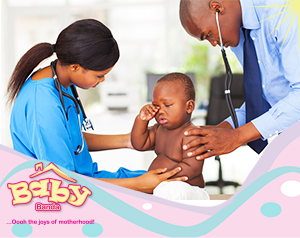• Getting a jab is quite a scary time for most of us. To get your baby to have an easier time during vaccinations you can try to ease the discomfort
o Stay calm, if you panic, your baby panics too
o Hold your baby, if you can during the procedure and after
o Put her on the breast for some comfort feeding
o Use other forms of distraction such as rocking, singing, giving a toy
• Take your baby back to the hospital if you notice these symptoms
o A very high fever that is persistent
o has unusual cry or cries incessantly
o has a severe rash or swelling
o Starts to have convulsions or fits
o Starts to have difficulty breathing, pale, fast heartbeat, etc.
o Refuses to feed
• Sometimes there are several reasons that a baby may not be vaccinated. These include
o If your child is sick with a high fever, your doctor may choose to wait for your baby to get better first
o If your baby has a medical condition e.g. poor immunity, neurological disorder, abnormal development, etc.
o has received a recent infusion of blood products e.g. immunoglobulins
o If your baby has had a severe reaction to a vaccine before
• 2 – 3 weeks after BCG vaccination, a small red lump usually appears at the injection site. This lump may increase in size and develop into an ulcer with a crust forming over it. A scar remains after the crust falls off. Avoid cleaning it with spirit or disinfectant when it appears













